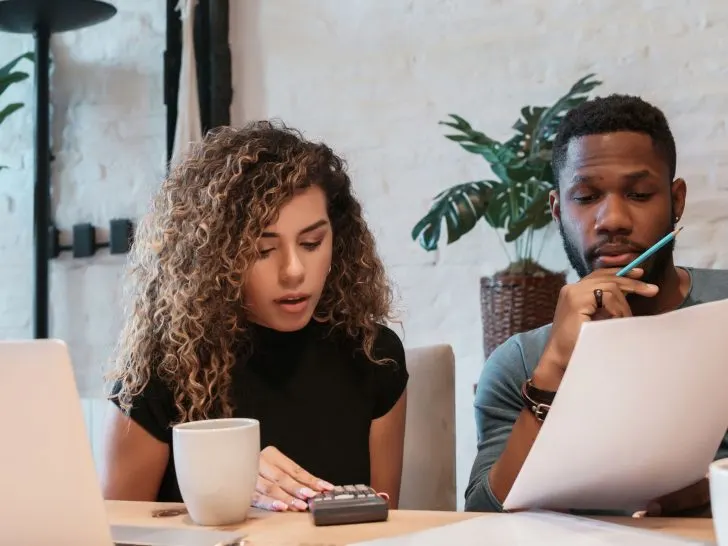You’ve fallen in love and everything is progressing towards wedded bliss. People give you all kinds of advice about careers, kids, and even your sex life. But everyone is too polite to discuss how to handle finances in a relationship.
Money is cited as the main cause for divorce 24% of the time.
When I got married we spent tens of thousands of dollars on a lavish wedding yet weren’t financially able to purchase a home. Neither of us had a financial plan and we weren’t on the same page at all.
Fourteen years later we are in nearly total alignment about the topic of money. Money has given us the power to travel the world, live abroad, and not be stressed about how to afford things.
It’s easier than you think to go from being a financial mess to being in sync with your partner. Try these tips to get on common ground.
Skip to:
- Start the Conversation
- Financial Background
- Joint Financial Goals
- Financial Check-Ins
- Professional Help
Disclaimer: I am not a financial planner or credentialed in any way for financial services.

I share products I love with you through affiliate links, which means if you buy something through one of these links, I get a small commission at no extra cost to you.
Starting the Conversation
When you’re learning how to handle finances in a relationship, the first step is initiating open communication. Begin by setting a specific time to sit down and chat about financial goals and expectations. This proactive approach underscores a commitment to financial transparency and mutual understanding.
Open the floor to honest discussions about income, debts, and spending habits. It’s important to speak candidly but kindly, using “I” statements to express your feelings rather than pointing fingers. For instance, you might say, “I feel it’s important we plan for future expenses,” to foster a collaborative rather than accusatory tone.
By fostering a space where both partners feel heard and respected, money talk becomes a tool for strengthening your healthy relationship. Keep the conversation ongoing with scheduled check-ins to adjust goals, celebrate successes, and navigate challenges together.

Understanding Each Other’s Financial Background
When starting to handle finances in a relationship, it’s best to have a clear picture of your partner’s financial history. This includes knowing about each other’s credit scores, which play a crucial role in future financial endeavors like applying for loans or buying a home. It’s a good practice to openly share these figures to gauge creditworthiness and financial behavior.
Next, discuss student loans and other debts either of you may have. This helps in understanding the obligations that may impact your combined financial situation. A transparent conversation about debts will lead to better strategies for paying them off together.
Also, consider your money habits and attitudes towards spending and saving. Are you a saver or a spender? What about your partner? Map out your financial future by acknowledging your current situation and future goals. Discussing your expectations for financial independence ensures that you’re both moving in the same direction. Here’s a quick checklist:
- Check and discuss credit scores
- Disclose the full extent of any debts (student loans, credit cards, auto loans)
- Share your long-term financial aspirations
Building a strong foundation in how to handle finances in a relationship starts with complete transparency about your financial past. Address your different attitudes and habits around money to forge a path that supports both of your dreams. Remember, the aim is to create a plan that serves both partners fairly and fosters a financially responsible future.
Setting Joint Financial Goals
When learning how to handle finances in a relationship, setting joint financial goals is a primary step. It lays the foundation for a strong financial future together and ensures that you are working towards common objectives.

Deciding on Bank Accounts
Choosing the right banking setup can play a crucial role in reaching your financial goals together. Consider a joint bank account for household expenses and savings goals like a down payment on a home. However, maintaining individual accounts can provide personal financial autonomy. A hybrid approach balances shared responsibilities with individual freedom.
Managing Debts and Savings
Addressing debts is just as important as planning savings. Create a plan to pay off debts, like student debts, together. For savings, set clear short-term and long-term goals such as emergency funds or retirement plans. Align your savings goals with future objectives like travel, children, or education.
Planning for the Unexpected
An emergency fund is fundamental for weathering a worst-case scenario. Aim to save at least 3-6 months’ worth of living expenses in a shared account. Additionally, review life insurance options and consider a prenuptial agreement or will to protect each other’s interests. These measures help safeguard your partnership against life’s uncertainties.
Regular Financial Check-Ins
When learning how to handle finances in a relationship, regular financial check-ins are crucial. These check-ins provide an opportunity for you and your partner to discuss spending habits, review shared expenses, and evaluate financial decisions. It’s a chance to align on goals and ensure both of you are contributing to joint finances in a harmonious way.

Scheduling Is Key
Schedule monthly meetings on your calendar, just like any important appointment. This formalizes the process and ensures that you both prioritize the conversation. Utilize a budgeting app to track your finances. This makes the review process efficient and straightforward during your check-ins.
The Agenda for Harmony
Begin your check-in by discussing the past month’s expenditures. Address any unplanned spending and adjust your budget accordingly. Next, review upcoming bills and shared expenses, making sure you’re both aware of how the costs will be divided.
Forward-Looking Financial Decisions
Don’t just focus on the past. Use your check-ins to look ahead. Are there big purchases or financial decisions on the horizon? Consider the impact these will have on your budget and how you can plan for them together to maintain financial harmony.
Open Money Conversations
Encourage open and honest dialogue without judgment. Rotate who leads the meeting to ensure equality in the partnership and a sense of shared responsibility. Remember, these discussions are about support and teamwork, not criticism.
Regular checks will empower you both to make informed decisions, achieve your financial goals, and maintain transparency in how you manage money together.
When to Seek Professional Help

Facing financial issues in your relationship can be challenging. You might wonder how to handle finances in a relationship effectively. Seeking professional help is a great way to find tailored solutions and strategies that align with your unique circumstances.
Financial Advisor or Planner
Consulting with a financial advisor or planner is a good idea when you need comprehensive financial planning. They can offer investment advice, retirement planning, and help create a long-term financial strategy for you and your partner.
Tax Advice
If you’re navigating complex tax situations, it’s wise to get tax advice from an expert. They can help ensure you’re taking advantage of tax benefits and adhering to regulations, thereby optimizing your financial decisions.
Financial Therapist
Sometimes, money problems are symptoms of deeper relationship issues. A financial therapist can address the emotional and psychological aspects of money management within your relationship. They provide a space to discuss money openly, helping to reduce stress and conflict.
Remember that professional help is not a last resort. It’s a proactive step towards a healthier financial future. Seeking advice from a financial professional can be a great way to ensure you and your partner are on the same page and working towards common financial goals.

You may also want to read:
- Go From Indifferent to Invested in your Marriage
- Discover the 7 Secrets of Communication for a Blissful Marriage
- Role of Trust and Transparency in Long-Term Partnerships
Building Financial Harmony
Crafting a successful financial partnership requires continual attention and communication. You’ve learned it’s essential to have a shared vision and make decisions together. This joint financial journey isn’t just about paying bills, but about supporting each other’s goals and dreams.
Embrace the notion that handling finances in a relationship is a continuous effort. Regular check-ins and open dialogue about money matters will help sustain your partnership. Remember, it’s less about the balance in the accounts and more about the harmony in your shared life.
When you wonder how to handle finances in a relationship, think teamwork. It’s the combined efforts, mutual respect, and understanding that steer you towards a thriving future together. Keep learning, growing, and adapting your financial strategies to reflect the life you are building. One budget, one investment, one dream at a time.


